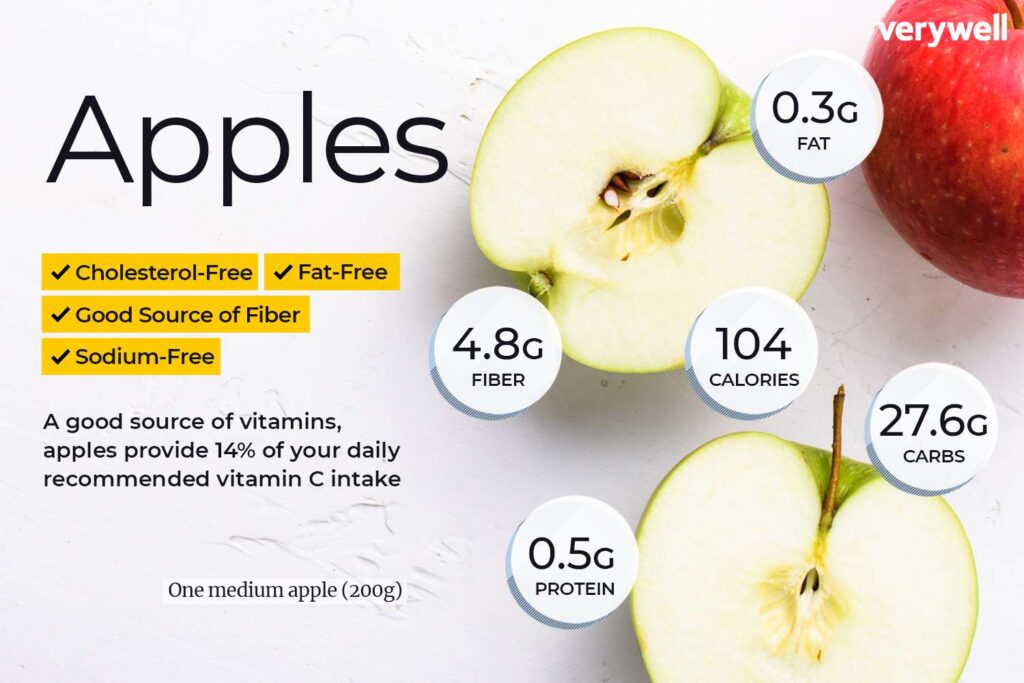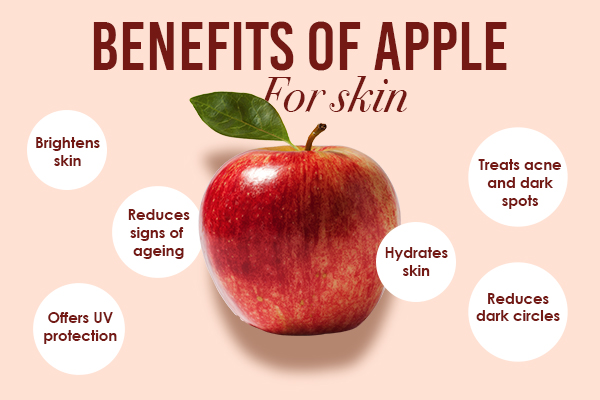Introduction:
In the realm of nutrition, few fruits hold as esteemed status as the humble yet mighty apple. From ancient mythology to modern dietary recommendations, apples have consistently been revered for their health benefits. In this comprehensive guide, we delve deep into the nutritional profile of apples, exploring their diverse array of nutrients and the multitude of health advantages they offer.
Table of Contents
The Nutritional Composition of Apples:
Apples are not just delicious; they are also packed with essential nutrients vital for overall well-being. A medium-sized apple typically contains approximately 95 calories, primarily derived from carbohydrates in the form of natural sugars, such as fructose, glucose, and sucrose.

However, what truly sets apples apart is their rich array of vitamins, minerals, and beneficial plant compounds.
The pleasure of crunching on a fresh, juicy apple is a sensory enjoyment shared via way of means of human beings from the beyond to the present. Apples are available in lots of types and are one of the maximum famous results worldwide. While apples might not appear the maximum exclusive or thrilling fruit, their dietary price should not be underestimated.
Vitamins and Minerals:
Despite their low-calorie count, apples boast a surprising array of vitamins and minerals. They are particularly rich in vitamin C, providing about 14% of the recommended daily intake per medium-sized fruit.

Additionally, they contain small amounts of vitamin A, vitamin E, vitamin K, and various B vitamins, including riboflavin, thiamine, and vitamin B6. In terms of minerals, apples contain potassium, manganese, copper, and small amounts of other minerals like calcium, iron, and zinc.
Vitamins and minerals are as important for dwelling as air and water. Not most effective do they hold your frame healthful and functional, they guard you from numerous diseases. Vitamins and minerals get thrown together, however, they may be pretty different. Vitamins are natural materials produced with the aid of using flowers or animals. They regularly are called “essential” due to the fact they may be now no longer synthesized inside the body (besides for nutrition D) and consequently need to come from food.
Fiber Content:
One of the most significant health benefits of apples lies in their high fiber content. A medium-sized apple can provide around 4 grams of dietary fiber, which is about 17% of the recommended daily intake. The majority of this fiber is found in the apple’s skin, making it essential to consume the fruit whole to reap the full benefits.

Fiber plays a crucial role in digestive health, promoting regular bowel movements, preventing constipation, and aiding in weight management by promoting satiety.
High-fiber foods in your diet are essential for maintaining good digestive health and overall well-being. Fiber aids in digestion, helps regulate blood sugar levels, and promotes a healthy weight. Here is a list of some common high-fiber foods along with their fiber content per 100 grams.
Antioxidants and Phytonutrients:
Apples are rich in antioxidants, including flavonoids and polyphenols, which help combat oxidative stress and reduce the risk of chronic diseases. Among these antioxidants, quercetin is particularly abundant in apples and has been linked to various health benefits, including reduced inflammation and improved heart health.
Additionally, the presence of flavonoids like epicatechin contributes to apple’s anti-inflammatory properties, further enhancing their nutritional value.
Health Benefits of Consuming Apples:
The nutritional richness of apples translates into a myriad of health benefits, making them a valuable addition to any diet.

Some of the outstanding benefits include Heart Health: Regular consumption of apples has been associated with a reduced risk of cardiovascular diseases, thanks to their high fiber and antioxidant content. Apples have been shown to help lower blood pressure, reduce cholesterol levels, and improve overall heart function.
Weight Management: The fiber content in apples promotes feelings of fullness and satiety, making them an excellent snack choice for those looking to manage their weight. Additionally, the natural sugars in apples provide a sweet fix without the excess calories found in many processed snacks.
Digestive Health: Apples are a natural source of both soluble and insoluble fiber, which helps promote digestive health by regulating bowel movements and preventing constipation. The consumption of fiber-rich foods like apples has also been linked to a lower risk of developing digestive disorders, including diverticulitis and colon cancer.
Blood Sugar Regulation:
Despite their natural sweetness, apples have a relatively low glycemic index, meaning They reason a slower and steadier upward thrust in blood sugar levels in evaluation to high-glycemic foods.

This makes them suitable for individuals with diabetes or those aiming to control their blood sugar levels.
Improved Immunity: The abundance of vitamin C in apples plays a crucial role in supporting a healthy immune system, helping the body fend off infections and illnesses. Regular consumption of apples may contribute to overall immunity and reduce the risk of common colds and infections.
Incorporating Apples into Your Diet:
With their versatility and wide availability, incorporating apples into your daily diet is both simple and enjoyable. Here are some creative ways to enjoy the nutritional benefits of apples:
Fresh and Raw: Enjoy a crisp, fresh apple as a convenient snack on its own or paired with a source of protein like nut butter for added satiety.
In Salads: Add thinly sliced apples to salads for a refreshing crunch and a hint of natural sweetness. Baked or Cooked: Incorporate apples into various baked goods, such as pies, crisps, and muffins, or cook them alongside savory dishes like roasted meats for a flavorful twist.
As a Beverage: Blend apples into smoothies or juices for a nutritious and refreshing drink option.
Conclusion:
In conclusion, apples stand as a shining example of nature’s nutritional bounty, offering a diverse array of vitamins, minerals, fiber, and antioxidants packed into a delicious and convenient package. From supporting heart health and aiding in weight management to promoting digestive health and boosting immunity, the benefits of incorporating apples into your diet are plentiful and well-supported by scientific research. So, the next time you bite into a crisp, juicy apple, savor not only its delectable flavor but also the wealth of health advantages it brings to your plate. In essence, by embracing the nutritional treasure trove of apples, you’re not just enjoying a fruit—you’re nurturing your body and embracing a healthier, more vibrant lifestyle.

